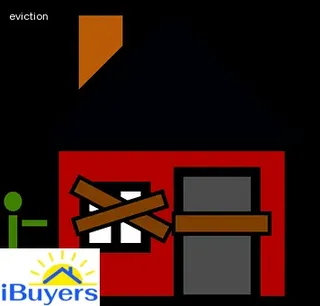Evictions in Texas are governed by the state's Landlord Tenant Act, which outlines the procedures landlords must follow to legally evict a tenant. Before a landlord can initiate an eviction process, they must give their tenant written notice to vacate the premises.
This notice must be delivered at least three days prior to filing an eviction suit in court. The amount of time it takes to complete the eviction process varies depending on whether or not a tenant chooses to contest the action.
If they do decide to contest, proceedings will take longer as the court will need to hear both sides of the case before making a decision. After all legal paperwork has been filed and served, if the tenant does not contest then a judgment for possession is rendered within two business days.
On the other hand, if a tenant appeals or requests a jury trial, then it may take several weeks or even months before an eviction court order is issued. Regardless of how long it takes for the final judgment to be made, landlords are encouraged to contact an experienced attorney who can advise them throughout the entire process.

The effects of an eviction notice in Texas can be far-reaching and have a long-term impact on a tenant's life. Receiving an eviction notice can make it difficult for tenants to find future housing, even if the eviction was not their fault.
Additionally, evictions often come with a damaging consequence on one's credit score, which can lead to further financial difficulties. Furthermore, the eviction process itself requires time and effort from both the landlord and tenant; this can include court appearances or other legal procedures that add stress to an already traumatic situation.
Eviction notices also may have a social stigma associated with them, which can make it difficult for tenants to explain their situation in the future without judgement or bias. Although the exact length of time it takes to complete an eviction process in Texas varies depending on individual cases, one thing is certain: An eviction notice has many negative consequences that are felt far beyond when it is received.
When a landlord in Texas decides to pursue eviction, they must first file a complaint with the court. Typically, this involves filling out paperwork detailing the tenant's violation of their lease agreement.
This paperwork is then filed with the court and served to the tenant. It is important to note that if a tenant does not answer or appear in court, then it is assumed that they accept responsibility for the violation.
Should this happen, the judge will likely order an eviction without further review of the situation. The entire process can take anywhere from two weeks to several months depending on how quickly the paperwork is received and processed by both parties involved.

When a landlord decides to evict a tenant in Texas, the first step is for the landlord to serve the tenant with written notice to vacate. This notice must be served either by certified mail or by posting it at the tenant's place of residence in a conspicuous location.
The notice must include the date on which the tenant is required to leave and it must also include certain language that sets out specific legal rights and obligations for both parties. The length of time required for service of this notice depends on whether it is being sent by mail or posted at the residence, but generally speaking, it should take no more than 10-14 days from when it was issued.
After serving this notice, if the tenant has not vacated by the specified date, then the landlord may proceed to file an eviction lawsuit with their local court.
The eviction process in Texas can be a lengthy one, but there are certain circumstances that can lead to an eviction suit being filed. The most common reason for an eviction suit is if the tenant has failed to pay rent or has violated the lease agreement.
In certain cases, a landlord may also file an eviction suit if the tenant is causing a nuisance, such as by creating excessive noise, damaging property, or engaging in criminal activity on the premises. Additionally, if a tenant fails to move out after their lease has expired, the landlord may choose to file an eviction suit in order to have them removed from the property.
These are just some of the possible reasons why a landlord may choose to pursue an eviction suit in Texas.

In Texas, landlords may legally terminate a lease agreement for several reasons. These common grounds for eviction include violations of the lease, failure to pay rent on time, causing excessive damage to property, engaging in criminal activity on the premises, and creating a nuisance that disturbs other tenants.
Additionally, if a tenant has been renting a property for more than one year without renewing the lease or signing a new one, the landlord may start termination proceedings. In this case, the landlord is required to give at least 60 days' notice before terminating the lease.
Finally, when military personnel are deployed or reassigned due to their service obligations they may terminate their lease without penalty.
Once a landlord has filed an eviction complaint in Texas, there are a few steps that must be taken before the eviction is completed. The tenant must be officially served with the complaint, which is typically done by a law enforcement officer or process server.
After service of the complaint, the tenant will have seven to twenty-one days to file an answer with the court, depending on the county. If no answer is filed, the landlord can request a default judgment from the court and proceed with evicting the tenant.
If an answer is filed, then a hearing will be scheduled where both parties can present evidence and legal arguments. After hearing both sides of the case, the judge will issue their ruling which could either be in favor of the landlord or deny their claim.
In either case, if either party disagrees with the judge’s ruling they may appeal it within six days of being notified of its decision. Following this step, if there is still no resolution between landlord and tenant then further actions will be needed to complete the eviction process.

A Writ of Possession is a document issued by the court to allow the sheriff or constable to evict tenants from their home. It grants the landlord possession of the property and requires the tenant to vacate within a certain timeframe.
After the writ is issued, it must be served on the tenant(s) in person or by posting it at the property. Once served, a notice will be sent to the tenant advising them of their rights and that they must leave within 24 hours or face eviction.
The landlord may also pursue other legal remedies such as court costs and damages. If the tenant fails to comply with these notices, they may be subject to removal from the property by law enforcement officers.
The entire process typically takes anywhere from one week to three months, depending on how quickly an agreement can be reached between both parties involved in the eviction process.
When evicting a tenant in Texas, it is important to note that certain documents and forms must be completed in order to make the process legal. The landlord must first provide written notice of the eviction, or a "notice to vacate," which gives the tenant three days to leave or face eviction proceedings through the court system.
If the tenant chooses to challenge the eviction, they must file an answer with the court within five days of receiving notice. The landlord must also serve a copy of the petition for eviction on the tenant within two weeks of filing it with the court.
This can be done by posting notice on their property or delivering it directly to them. Additionally, landlords are required to provide supporting documentation such as rental agreements and receipts for rent payments when filing an eviction suit against a tenant.
Lastly, landlords should always consult with an attorney before moving forward with any type of eviction process in Texas.

The eviction process in Texas is long and arduous, often taking several months from start to finish. After a landlord has filed an eviction notice with the court, there is a required waiting period before any further action can be taken.
Once that waiting period has passed, the landlord may request the return of possession from the tenant. This involves sending either a written or verbal notice to the tenant informing them that they must vacate the property within a certain time frame.
If the tenant does not comply with this notice, then the landlord may file for a Writ of Possession with their local court; which will allow them to take back possession of their property without going through a full trial. It is important to remember that all steps of this process must be followed precisely in order to remain compliant with relevant laws and regulations.
The eviction process in Texas can be a complex and lengthy one. The timeline on which it can be completed varies greatly depending on the situation and the county in which it is taking place.
Generally, the timeline of an eviction starts with a landlord delivering a written notice to the tenant informing them that they are being evicted. After this notice is delivered, the tenant typically has three to five days to respond.
At this point, if the tenant does not comply with the terms of their lease or vacate the property, then their landlord may proceed with filing for an eviction lawsuit. Once the paperwork is filed with the court, a hearing date will be set for both parties to present their case before a judge who will make a ruling regarding whether or not an eviction should take place.
If granted, then generally within two weeks from when it was initially filed, an eviction order will be issued and served by law enforcement officials giving tenants at least 24 hours before they must vacate premises.

When it comes to the eviction process in Texas, one of the most important steps is appearing in court. During the eviction hearing, tenants must be prepared to provide evidence that they are up-to-date on rent payments and should have proof of any agreements made with their landlord.
It's also wise for tenants to bring a witness or two who can testify on their behalf. Landlords must also present evidence at an eviction hearing, such as receipts for rent payments and copies of rental agreements.
The court will examine all available information before making a decision, which could take several hours or days depending on the complexity of the case. It's important for both tenants and landlords to be honest and forthcoming during an eviction hearing so that the court can make a fair ruling in a timely manner.
The eviction process in Texas is subject to state-wide regulations that set out the rules and procedures landlords must follow. As a landlord, it’s important to understand the ins and outs of the eviction process as well as any forms or paperwork you may need.
To begin an eviction case, landlords must provide written notice of their intent to evict, which must be delivered either in person or by mail. Depending on the reason for eviction, this notice must include specific information and may require additional forms.
In some cases, tenants have a right to repair or cure the issue before being evicted. After providing notice, landlords must file a lawsuit in court if their tenant does not voluntarily move out.
The court will then review evidence from both sides before deciding whether to grant an eviction order. If so, it can take anywhere from two weeks up to several months for tenants to be legally evicted from their home in Texas.

The eviction process in Texas is often a lengthy and complicated endeavor. It is important to understand the different steps that are involved and how long each step may take in order to be fully prepared for the entire process.
Every state has its own laws regarding eviction, so it is essential to consult an attorney who is familiar with the specific rules of Texas when filing an eviction case. Generally speaking, there are several key stages involved in the eviction process including: serving notice to tenants, initiating court proceedings, attending court hearings, obtaining a writ of possession, and finally executing the writ of possession.
The exact timeframes for each step vary depending on several factors such as the type of lease agreement and local court regulations. However, as a general rule, it typically takes between one to three months from start to finish for an eviction case in Texas.
During this time period, landlords must adhere strictly to all applicable laws or risk facing legal repercussions. Understanding these timelines can help both landlords and tenants prepare for what lies ahead during the eviction process in Texas.
When it comes to the eviction process in Texas, there are several steps that must be taken before a landlord can legally ask for possession of a rental property. The first step is determining the reasons for asking for possession.
Depending on the situation, this may include non-payment of rent, damage to the property, or other violations of the lease agreement. Once these reasons are established, landlords must provide proper notice of termination for cause which is outlined in state law.
It is important to understand how long an eviction process takes in Texas as there are legal requirements for notices and documentation that need to be followed according to state laws in order to complete the process successfully. There are also additional resources available online with free downloads pertaining to evictions in Texas should you need further information about the process.
In Texas, eviction court is the first step in the eviction process. Once the judge has ruled in favor of the landlord and a judgment is issued, tenants have to move out within a certain period of time.
The amount of time allowed to vacate depends on the type of lease agreement that was signed. Generally, tenants have between three days and one week to move out after being evicted from their home or rental property.
However, if the tenant appeals the eviction decision, it can take longer for them to be required to leave. It's important for tenants in Texas to understand their rights when it comes to eviction proceedings as well as how long they have after an order for removal has been issued before they must vacate the property.

The fastest way to evict a tenant in Texas is to use the summary eviction process. Summary eviction is a legal term that allows landlords to evict tenants quickly, without having to go through an extensive trial.
This process is only available in certain circumstances and must be filed with the court system. The process typically takes between one and two months, depending on how long it takes the tenant to respond.
While it's always important for landlords to understand their rights and responsibilities under the law, this process can be beneficial if done correctly and quickly.
When you get an eviction notice in Texas, the first thing that happens is that your landlord will file a lawsuit known as a forcible detainer suit in the Justice of the Peace Court. This establishes their legal right to evict you from the property.
You will then receive a summons and complaint from the court, which informs you of the date and time when you must appear in court for a hearing. At this hearing, both parties can present evidence, make arguments, and call witnesses if necessary.
The judge then decides whether or not your landlord has grounds to evict you from the property. If so, you may be ordered to move out within three days or face further legal action.
If you choose to contest the eviction, it can take additional weeks before a ruling is made. In some cases, you may also have access to legal aid if needed during this process.
In Texas, the eviction process can take anywhere from a few days to several weeks depending on the circumstances. The question of whether or not you have to go to court for an eviction in Texas is based on the individual situation.
If there is a disagreement between the tenant and landlord, then it may require a hearing in court. Landlords must give tenants written notice that they are being evicted and provide an opportunity for them to comply with the lease before taking legal action.
However, if the tenant does not agree to move out, then the landlord can file an eviction suit in court. The court will review both sides of the dispute and make a determination as to whether or not an eviction is warranted.
The tenant is then given a certain amount of time (generally 5-7 days) to respond before their case goes to trial. Once a judgement has been made, it is up to law enforcement officers to physically remove tenants who still refuse to leave after their allotted time has passed.